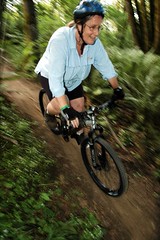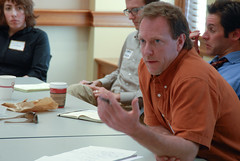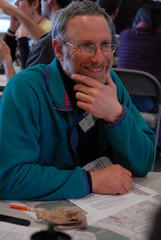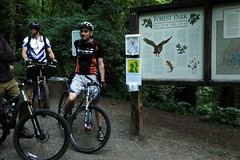
Gregg Everheart enjoys a rare piece of
Forest Park single track.
(Photos © J. Maus)
Ever since citizen activist Frank Selker launched his grassroots campaign to garner support for more bicycle access in Forest Park, progress has followed at a steady clip.
The community responded quickly, business support followed, and even City Commissioner Nick Fish added his support to the effort. But all along, even as momentum and the coalition of advocacy grew around the issue, opposition simmered under the lid. Now, with the formation of an official Parks Bureau committee to look into how increased bike access will play out, those opposing voices are being heard.
Marcy Houle, a member of the Forest Park Single Track Cycling Advisory Committee recently circulated a six-page letter to “All Who Care About Forest Park”. In the letter (download below), Houle — an author who has written a book about Forest Park — warns that the “lovingly and carefully stewarded” park we all know and love will “transform irrevocably” if “cycling enthusiasts” get their way.
Here’s an excerpt from Houle’s letter:
“A proposal from cycling enthusiasts to greatly increase the amount of biking routes in Forest Park is currently being highly promoted citywide. Unknown by most park users, mountain biking advocates are rapidly gaining momentum, funding, and political clout. The bike industry is heavily pushing for singletrack trails in Forest Park to make a ‘world class singletrack in our backyard’.”
In her letter, Houle states she’s concerned that more bikes in the park would result in erosion, damage to the parks “ecological health”, and an increase in near-misses between people riding bikes and people on foot. The most serious issue for Houle — and the one that is likely to cause the most consternation in the minds of bike advocates and Commissioner Fish — is that an increase in mountain biking in Forest Park runs afoul of the Forest Park Natural Resources Management Plan which was adopted in 1995.
Houle’s opposition caught the attention of The Oregonian, who published an article saying talks of new bike access had reached an “impasse” and that, by supporting the idea, Commissioner Fish had “stepped into a public tempest”.
But Tom Archer, the advocacy director for Northwest Trail Alliance and also a member of the Parks Committee, says Houle missed the first two Committee meetings and came to the third without fully understanding what was being proposed. When she did hear the ideas on the table she was “obviously distressed with the charge of the group.” Archer said he and others tried to reach out to her to explain the proposal but that “she didn’t want to talk with us.”
Archer, and other bike advocates who have been working with Parks on this issue for years, say the Parks Committee was formed to find out how best to move forward with increased bike access (by summer 2010), not if it should happen at all.
“[Commissioner Fish] started to play with the park before reading the instructions. When I met him 2-3 weeks ago he hadn’t even read it.”
— Les Blaize
Another person on the Parks Committee who has been vocally opposing the idea is Les Blaize, a 30-year veteran of Forest Park advocacy who owns land adjacent to it and who represents Neighbors West/Northwest, a coalition of 13 neighborhoods in the area.
In a phone call today about the issue, Blaize summed up his feelings like this: “I’m not against access for bikes, I’m for health of the park with respect to all user groups. I’m a steward of this park. A steward considers the health of the park first, and secondly a steward has to be prepared to give up what they want for the park.”
Blaize maintains that nobody is excluded from trails in the park “only their form of transportation”. Bikes can ride on 30 miles of roads, he points out, and “they can walk theirs bikes” on the trails if they want to.
Blaize is critical of Commissioner Fish’s support of the idea, saying “He [Fish] started to play with the park before reading the instructions. When I met him 2-3 weeks ago he hadn’t even read it.”
Blaize feels that the issue isn’t about bikes, it’s about being true to the park’s management plan (a.k.a. “instructions”).
The Forest Park Management Plan does not specifically prohibit bicycles (they’re currently allowed, but only on wide, fire lane roads, with the exception of a 1/3 mile section of new singletrack), and it actually encourages their use and leaves the possibility open for expansion of bike acccess. However, the plan does warn against overuse. From Page 84 of the plan:
“One of the first steps is to either determine how much recreational use can be accommodated without any adverse effects or to determine the amount of deterioration that is acceptable. This is done through observation, research, baseline inventories of vegetation and wildlife habitat, consultation with experts and periodic monitoring of the resources.”
According to Blaize, “Instead of looking for ways to follow the plan, we’re looking for ways to go around the plan, that doesn’t make sense. That’s not the stewardly thing to do.”
But Frank Sekler objects to the notion that he or other bike advocates are looking to circumvent the plan. In a letter to Commissioner Fish refuting claims made by Houle (download it below), he wrote:
“Nobody is proposing anything that is in opposition to the 1995 Management Plan. The plan specifically places a priority on recreational uses, specifically supports cycling and adding cycling opportunities, and specifically calls for partnerships that bring private funds to bear on the Parks needs. Nobody has questioned whether Parks and the city will follow the legal rules and procedures – of course they will.”
The plan also says major usage increases — by any user group — must be accompanied by surveys and extensive monitoring.
Blaize and Houle are opposed to increased bike access on the grounds that not enough data exists yet about the health of the park and how more bike access would impact it. Since 1996, the amount of people hiking and running in the park has increased dramatically. However, no such survey, monitoring, or baseline studies have ever been for those uses.
Does Blaize then think that there should be caps or prohibitions on the number of people walking and running in the park? “Sure. Eventually… It’s specifically in the plan. If you find a resource is being negatively impacted.”
But, since there’s not budget to do such surveys, the argument quickly becomes circular.
Several times during our conversation Blaize referred to a “hurdle” of increasing bike access being that “one user group can’t take anything away from another user group.”
Frank Selker, says that’s precisely the wrong attitude. “It’s about sharing” says Selker. “Currently walkers have access to every inch of trails in Forest Park while cyclists have access to less than a mile of true trail.”
Blaize says everyone should just be content with what they have. “I’m content, why can’t everyone be content with what they have.” I reminded Blaize that he’s likely content because he can hike and walk on every trail in the park — a luxury not afforded to people on bicycles.
“If we were talking about how there was no access at all you’d have some legs… But your legs are dwindled because you do have access [referring to the fire road access].”
On the topic of sharing existing trails (which is sure to be a heated discussion before this is all done), Blaize worries that that concept would turn Forest Park “into a theme park”:
“Just imagine if we took all the trails and shared them [which is nowhere near what’s being proposed]. Linnnton would have hotels, people would come from all over to ride. It would blow the park away! The use would be incredible because it would be a glorious experience. But, it would decimate the park because of the amount of usage increase.
Until the science is done, I feel that anything that dramatically increases use will have a detrimental effect on the park.”
Blaize thinks a way forward is to convert some existing fire lanes into narrower single-track style trails. Some bike advocates also like that idea, but warn it’s difficult and expensive to do. To them, sharing existing trails is still something that should remain on the table (although they concede that Wildwood is a non-starter due to its popularity with people who hike).
The Parks Committee meets again tonight. This is a complicated issue, and we’ll continue to keep you posted as it develops.
— Read Marcy Houle’s letter (PDF)
— Read Frank Selker’s reply (PDF)
Marcy Houle did not respond to our request for comment on this story.
For more information, read our analysis and download the recently drafted White Paper on Mountain Biking in Forest Park.




